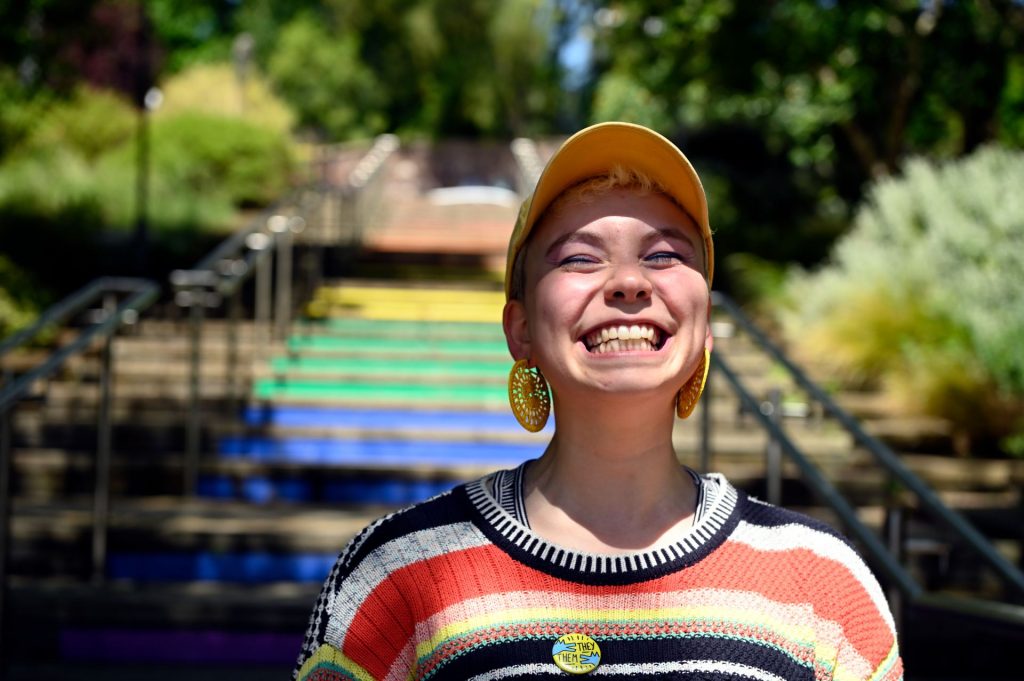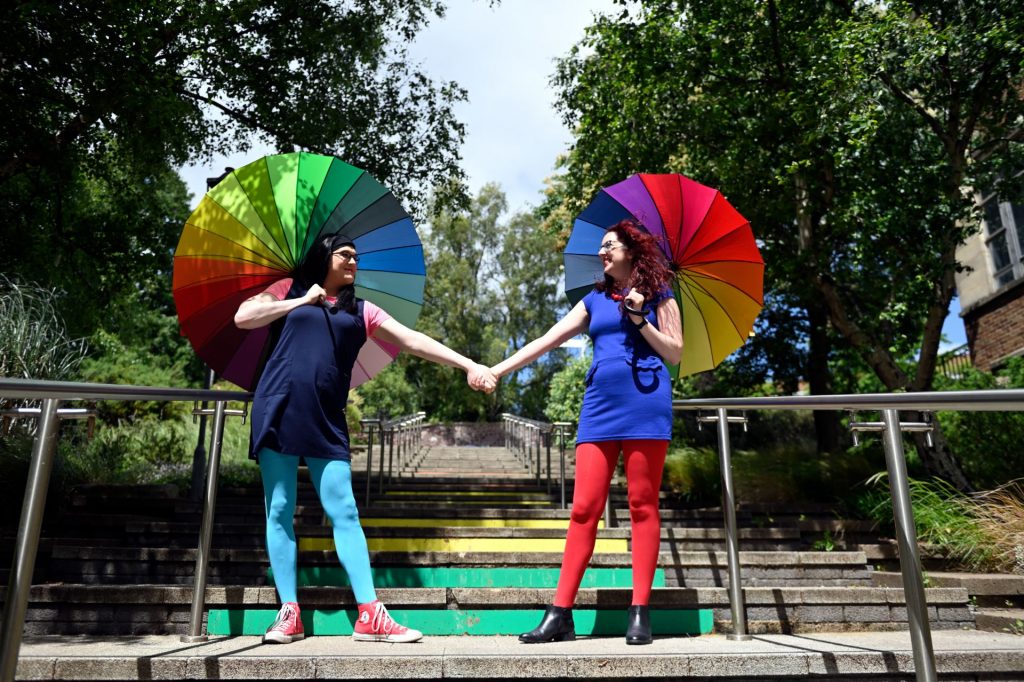Part four – Erin, Joanne and Meimei
Erin
UG, Mechanical Engineering (MEng)

How do you identify?
Non-Binary, Queer
What does Pride mean to you?
It’s about safety in numbers. Pride is still a protest and despite the visibility of LGBTQIA+ people in the UK, even here we need to keep pushing for more rights (especially regarding trans and non-binary identities).
Have you been on a Pride march before and what are your memories?
Once – I went to Norwich Pride in 2019. The bus into town didn’t show up but a lovely person wearing rainbows and a “Free Mum Hugs” t-shirt was passing and offered to take me with her. We had a blast listening to music the whole way there and she really calmed my nerves about my first march.
What does it mean to you to be part of the LGBTQ+ community?
Queer culture is very vibrant and fun! But talking to others in the community has also lead me to realise that people live and express themselves very differently and no way is the right way. And because of this, it’s taught me the importance of solidarity and intersectionality with each other and other marginalised communities.
And how important is it to study in such a diverse place?
I discovered that I’m non-binary during lockdown and coming out of it, I didn’t entirely know how my wider group of friends would react. But I know that Bristol attracts open-minded and accepting individuals and so I felt safe. I’m out to most people now, including my lecturers, and it’s really freeing to know that it’s safe to be myself at university.
Joanna Sansom and Meimei Leigh
Library supervisor in customer services and Physics student and library support assistant.

How do you identify?
Joanna: Interesting question! For about twenty years I identified as bisexual. However, I’m very in support of the breakdown of the binary in the LGBT and wider world. So these days I tend to put myself more generally under the ‘queer’ umbrella.
Meimei: I am currently identifying as trans-pansexual. For most of my life, my sexuality has been very much a moving target. So, I identify as pansexual because my sexuality could be anywhere at any time.
How did you meet?
Meimei: We met online when we both lived in London. For the first six months of the relationship, I was presenting male. After I met Joanna, that’s when it became really clear that I was a woman.
I had to come out to Joanna, which was scary, as we’d only been dating a few months. We’ve now celebrated 5 years together. We didn’t even have lockdown arguments.
Joanna: I didn’t know Mei Mei that well when she realised she was a woman. But she was much more comfortable in her own skin after she came out, so it made a lot of sense to me.
What has your experience of Bristol been?
Meimei: I wasn’t presenting feminine full time before I moved to Bristol. The University Campus is the safest place I feel I’ve ever been.
I always feel safe here whether I’m working in the library or going to lectures. It means a lot to me to be able to do that. I guess it’s everything to me that I get to be able to do that every day.
Joanna: We are out as a couple here. The University is great. I describe Mei as my partner and then I say ‘she’. The library is really diverse so it’s been great.
It’s really important to me to be your whole self at work.
Has it always been this way?
Meimei: It had to be quiet for some time, even when I was living in London. A long time when my family didn’t know. But as trans people go, I think I have been extremely lucky with the response of family and friends and in that I didn’t lose anyone along the way, which is the story for almost nobody who is trans, even in this country, in this decade. People are still losing friends and family over it. I was very lucky.
Any tips you would give to make people feel comfortable at work?
Joanna: Don’t be afraid to ask what people’s pronouns are or how they identify or how their partner identifies. And keep trying. If you make a mistake don’t worry – it happens. Just keep trying.
Meimei: I can mainly comment of the school of Physics, but the University is a very safe place for you. It’s important that you have someone to talk to, so, I would recommend choosing someone you can trust and confiding in that one person. You should never be alone in this and you’re not.
What does Pride mean to you both?
Meimei: Pride means making as much noise as we can for people who have to be silent. There are people all over the world who have to be silent, or it would cost them their lives. So it’s important for those of us who can, to make noise and be as loud as we can every time.
Joanna: Pride for me is celebrating our community, our past, our present, our future – and progress within the community and a time to celebrate that is really important to everyone.
Can you tell me about your very first Pride march?
Joanna: I’ve only been in Bristol for a couple of years and my first Pride march was in London. I felt quite emotional; I had recently returned from travelling and was at the march on my own, but I felt very connected to the people around me. It felt wonderful to be a part of something and to see such an international community of people.
Meimei: Perhaps surprisingly, I have never been to pride. I was far too deeply in the cupboard while I lived in London. Because of covid and lockdowns this is the first year in Bristol that I will be able to attend.

